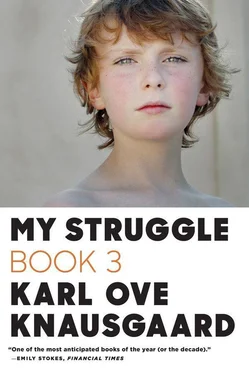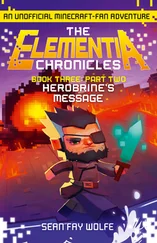Despite this incident and the unease I could occasionally feel when I was paddling in the narrow inlet, I always looked forward to these trips. Sitting on a towel beside Yngve and scanning the light-blue, mirror-glass sea that only ended on the horizon, where big ships glided slowly past like hour hands, or looking at the two lighthouses on Torungen, the white a sharp contrast with the bright blue sky: not much was better than that. Drinking pop that had been in the red-checked cooler bag, eating cookies, perhaps watching Dad as he walked to the edge of the rocks, tanned and muscular, and dived into the sea two meters below a second later. The way he shook his head and stroked back the hair from his eyes when he emerged, the rush of bubbles around him, a rare gleam of pleasure in his eyes as he swam to shore with those slow, ponderous lunges of his arms, his body bobbing up and down in the swell. Or walking to the two sinkholes nearby, one a man’s depth with distinct spiral marks in the rock on the way down, filled with salty seawater, covered by green sea plants and at the bottom clusters of seaweed, the second less deep but no less beautiful for that. Or up to the shallow, extremely salty, hot pools that filled the hollows in the rock, refreshed only when there were storms, the surface thick with tiny, swirling insects and the bottom bedecked with yellow, sickly-looking algae.
On one such day Dad decided to teach me how to swim. He told me to follow him down to the water’s edge. Perhaps half a meter below the surface, a small, slippery ridge overgrown with seaweed jutted into the sea, and that was where I was to stand. Dad swam out to a reef four or five meters from the shore. And turned to face me.
“Now you swim over here to me,” he said.
“But it’s deep!” I said. Because it was, the seabed between the two reefs was barely visible, it was probably three meters down.
“I’m here, Karl Ove. Don’t you think I could rescue you if you sank? Come on, swim. It’s not in the slightest bit dangerous! I know you can do it. Launch yourself and do the strokes. If you do that you can swim, you know! Then you can swim!”
I crouched down in the water.
The seabed was a greenish glimmer a long way down. Would I be able to float over that?
My heart only beat this hard when I was frightened.
“I can’t,” I shouted.
“Course you can!” Dad shouted back. “It’s so easy! Just push off, do a couple of strokes, and you’ll be here.”
“I can’t!” I said.
He studied me. Then he sighed and swam over.
“OK,” he said. “I’ll swim beside you. I can hold a hand under your tummy. Then you can’t sink!”
But I couldn’t do it. Why didn’t he understand?
I started to cry.
“I can’t,” I said.
The depth of the water was in my head and in my chest. The depth was in my arms and legs, in my fingers and toes. The depth filled all of me. Was I supposed to be able to think that away?
There weren’t any more smiles to be seen now. With a stern expression he clambered onto the land, walked over to our things, and returned with my life jacket.
“Put this on then,” he said, throwing it to me. “Now you can’t sink even if you tried.”
I put it on, even though I knew it didn’t change anything.
He swam out again. Turned to face me.
“Try now!” he said. “Over here to me!”
I crouched down. The water washed over my trunks. I stretched my arms under the water.
“That’s the way!” Dad said.
All I had to do was push off, do a few strokes, and it would all be over.
But I couldn’t. I would never ever be able to swim across that deep water. Tears were rolling down my cheeks.
“Come on, boy!” Dad shouted. “We haven’t got all day!”
“I CAN’T!” I shouted back. “CAN’T YOU HEAR?”
He stiffened and glared at me, his eyes furious.
“Are you being belligerent?” he said.
“No,” I answered, unable to suppress a sob. My arms were shaking.
He swam over and took a firm grip of my arm.
“Come here,” he said. He tried to tow me out. I twisted my body toward the shore.
“I don’t want to!” I said.
He let go and took a deep breath.
“You don’t say,” he said. “We know that much.”
Then he went to where we had left our clothes, lifted the towel with both hands, and rubbed his face. I took off the life jacket and followed him, stopping a few meters away. He raised one arm and dried underneath, then the other. Bent forward and dried his thighs. Threw the towel down, picked up his shirt, and buttoned it while surveying the perfectly calm sea. Then he pulled on a pair of socks and stuck his feet in his shoes. They were brown leather shoes without laces, which matched neither the socks nor his bathing trunks.
“What are you waiting for?” he said.
I pulled the light blue Las Palmas T-shirt I had been given by my grandparents over my head and laced up my blue sneakers. Dad tossed the two empty pop bottles and the orange peel into the cooler bag, slung it over his shoulder, and set off, the wet towel crumpled up in his other hand. He said nothing on the way to the car. Opened the trunk, put in the cooler bag, took the life jacket from my hands, and placed it next to the bag together with his towel. The fact that I also had a towel didn’t seem to enter his head and I certainly didn’t intend to bother him with that.
Even though he had parked in the shade, the car was in the sun. The black seats were boiling hot and burned against my thighs. I wondered briefly whether to put my wet towel over the seat. But he would notice. Instead I placed my palms downward and sat on them, as close to the edge as I could.
Dad started the car and drove off at walking speed; the whole of the open gravel area, known as the firing range, was full of large stones. The road he took afterward was pitted with potholes, too, so he drove equally slowly along there. Green branches and bushes brushed the hood and roof, sometimes there was the odd thump, as a branch hit the car. My hands were still stinging, but less so now. It was only then it struck me that Dad was also wearing shorts on a red-hot seat. I glanced at his face in the mirror. It was grim and uncommunicative, but there was no indication that his thighs were burning.
When we came out onto the main road below the church he accelerated away and drove the five kilometers home at far above the speed limit.
“He’s frightened of water,” he told my mother that afternoon. It wasn’t true, but I said nothing. I wasn’t stupid.
A week later my grandparents on my mother’s side came to visit us. It was the first time they had been to Tybakken. Back on their farm in Sørbøvåg they weren’t the slightest bit out of place, they fit in perfectly, Grandad with his blue overalls and black narrow-brimmed hats, long brown rubber boots and constant spitting of tobacco, Grandma with her worn but clean, flowery dresses, gray hair, and broad body, and hands that always trembled slightly. But when they got out of the car in the drive in front of our house, after Dad had picked them up from Kjevik, I could see at once they didn’t fit in. Grandad was wearing his gray Sunday suit, light blue shirt, and a gray hat, in his hand he held his pipe, not by the stem, the way Dad did, but with his fingers round the bowl. He used the stem to point with, I noticed, when later they were being shown around our garden. Grandma wore a light-gray coat, light-gray shoes and on her arm she carried a bag. No one dressed like that here. You never saw anyone dressed like that in Arendal, either. It was as though they came from another era.
They filled our rooms with their strangeness. Mom and Dad suddenly behaved differently, too, mostly Dad, who behaved just as he did at Christmas. His invariable “No” became “Why not?”; his ever-watchful eyes became affable, and a friendly hand could even be placed on my or Yngve’s shoulder as a casual greeting. But even though he chatted to Grandma with interest, I could see that in fact he wasn’t interested, there were always brief moments when he looked away, and then his eyes tended to be utterly lifeless. Grandad, cheerful and enthusiastic, but somehow smaller and more vulnerable here than he was at home, never appeared to notice this trait of Dad’s. Or perhaps he just ignored it.
Читать дальше












